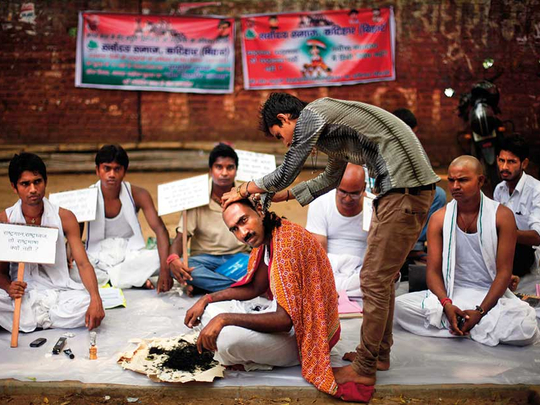
New Delhi: If the government has its way, the students of schools affiliated to the Central Board of Secondary Education (CBSE) and Kendriya Vidyalyas (KVs) may have to compulsorily study Hindi language till Class X.
In March, the Department of Official Language of the Home Ministry pulled out a 2011 report of a Committee of Parliament on Official Language and sent it to the President for approval. As many as 110 out of the 117 recommendations in this report were accepted by the President.
In consonance with that, the Home Ministry has issued an advisory to all states and government departments to implement the recommendations. Besides, the Ministry of Human Resource Development (HRD) has been instructed to form a policy in consultation with the state governments to make Hindi language compulsory in schools.
“The HRD Ministry should make serious efforts to make Hindi language compulsory in curriculum. As a first step, Hindi should be made a compulsory subject up to Class X in all schools of CBSE and Kendriya Vidyalaya Sangathan. The Centre should form a policy in consultation with state governments,” the presidential order said.
Experts and intellectuals condemn the recommendations by stating that they are against the spirit of the Constitution of India that was framed under the leadership of Dr B.R. Ambedkar.
“As a first step, Hindi is going to be made a compulsory subject up to Class 10 in all schools affiliated to CBSE and are run by Kendriya Vidyalaya Sangathan. As I can see things, this is going to create a lot of problems in several states, including both the Hindi-speaking and non-Hindi speaking states. This is clearly an attempt to divide the country,” says Delhi-based academician and linguist Swarnim Mishra.
Non-Hindi speaking states will bear most of the brunt if the recommendations are strictly implemented.
“Once the rule is enforced, if students studying in CBSE schools in Tamil Nadu or Andhra Pradesh select Telugu for regional language, they will have to mandatorily opt for Hindi instead of Sanskrit or a foreign language from class six to class ten. Earlier, students had an option of choosing between Hindi, Sanskrit or any other language as the third language from Class six to Class eight. This will create unnecessary hassles for lakhs of students,” says Nationalist Congress Party (NCP) leader Ramesh Gupta.
Telugu University Vice Chancellor Professor SV Satyanarayana, however, said there was no harm if the Centre sought to promote Hindi but it should not divide the country in any way.
“Learning English and Hindi languages are a must in present times. One cannot simply oppose the decision. However, the implementation should not come at the cost of regional language. The country is one despite its diversity and should remain so,” he said.
Uploading a video on his Twitter account, Dravida Munnetra Kazhagam (DMK) working president MK Stalin has accused the government of violating the Constitutional rights of non-Hindi speaking citizens of the country.
“The central government is attempting to destroy and decimate the unity of the nation. It is trying to relegate people who don’t speak Hindi, to second-class citizens and of pushing the country into becoming ‘Hindia.’ They have not only made Hindi a compulsory subject for CBSE schools across the country, their promotional campaigns are also exclusively in the Hindi script even when the words pronounced are in different languages,” he said.
Faced with criticism over the recommendation, Minister of State for Home Affairs Kiren Rijiju on Wednesday said the government was only promoting Hindi as per an Act of Parliament.
He said the recommendation is “in the form of a request and does not entail any form of order or instruction”.












